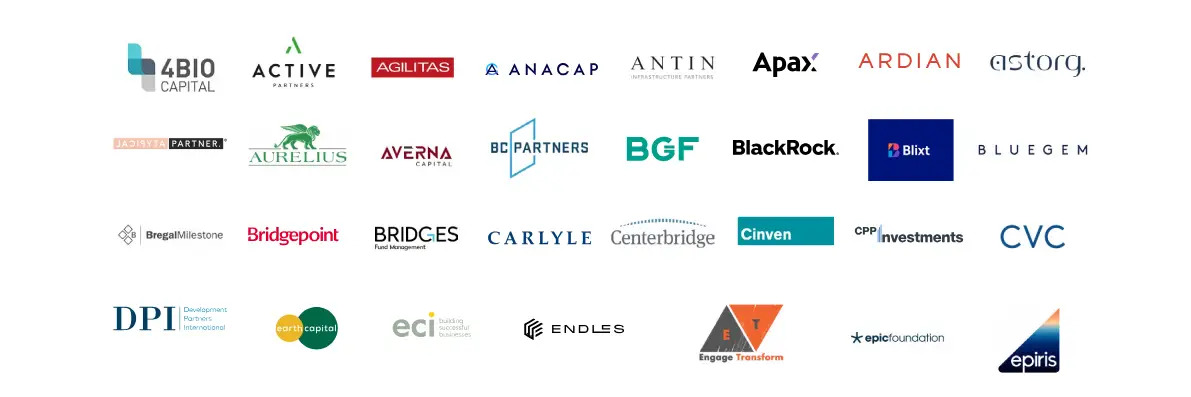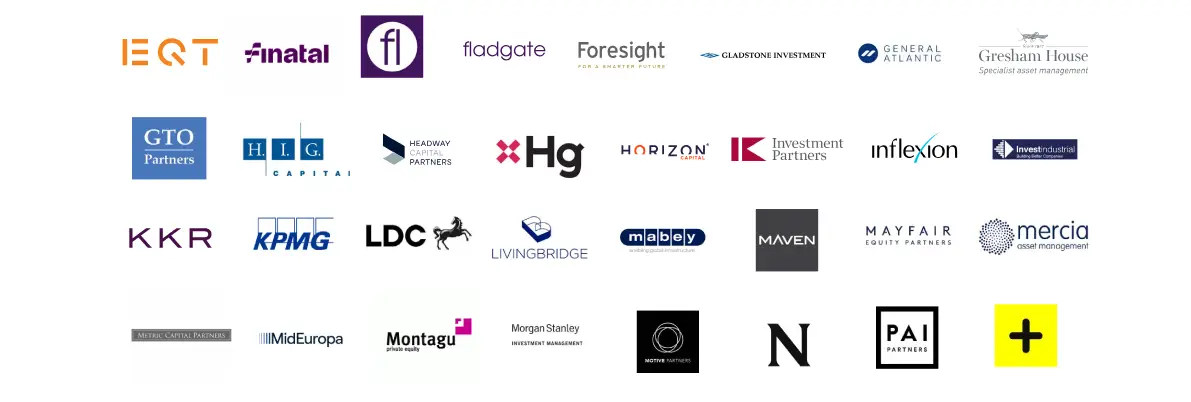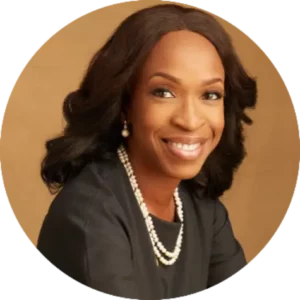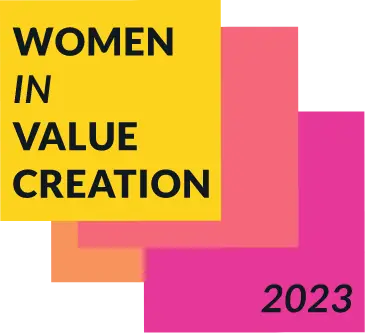
The Landmark, London
It was our pleasure to host another premium networking event at The Landmark Hotel in London
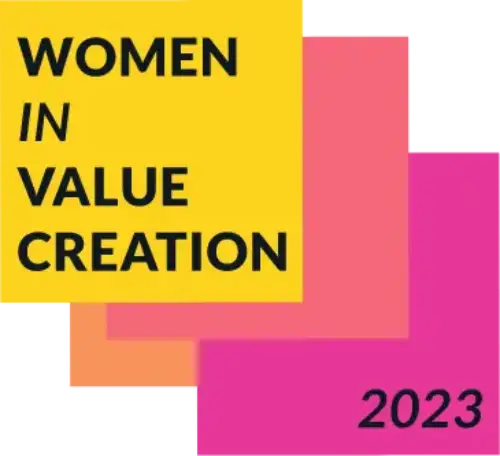
A huge thank you to all our speakers, sponsors and to our guests for their support, positive feedback and suggestions.
We look forward to seeing everyone again at one of our upcoming events.
Actum Group
“
Stay up to date
with Actum Group ![]()
events and news >
Targeted DEI initiatives are growing in private equity as the industry begins to address how its culture has historically impeded diversity.
A number of recent surveys have highlighted that talent management was the second strategic priority across firms of all sizes, and these priorities include increasing gender and ethnic minority representation.
Private equity holds a responsibility towards its portfolio companies and can play a catalytic role in closing the economic gender gap — while strengthening enterprise growth, job creation, and financial security.
The evening explored best practice in driving long-term transformation at the portfolio level and how diversity is a key driving force in value creation.
“
Thank you for putting together an event which contributes to inspiring young (and less young) PE ladies and making us progress towards more DEI.
Origin of delegates
From 107 organisations
UK
Rest of Europe
US
Delegates by industry
- GPs 84%
- Consultants/Advisors 9%
- Legal 4%
- Other 3%
Primary roles of delegates
Directors
Managing Directotrs
Managers
Partners
DR HEATHER MELVILLE, OBE
Specialist Advisor, Teneo; Chancellor, University Of York; CEO & Founder, Clarke Smith Advisory
PEJU ADEBAJO
NED Wolseley & Ibstock Plc
SARA ELLISON
Co-Head of Mid-Market Value Creation (PE), KPMG
TANYA TRACEY
CEO, GAIN – Girls Are INvestors
CORINNE SAWERS
Principal, KKR Capstone
SÉVERINE DE WULF
Managing Director, Portfolio Performance Group, PAI Partners
CÉCILE DUTHEIL
Head of Leadership and Culture – Portfolio, Triton
MAGGIE ALPHONSI, MBE
England Rugby World Cup Winner
KATHLEEN VAN AERDEN
Head of Research, Actum Group

Why KPMG value creation?
We can help you understand the risks and upside opportunities of a deal and understand where enterprise value can be improved. Ahead of a divestment, we can help you build a compelling plan for change, backed by data. We provide you with end-to-end delivery – from identifying where potential lies to implementing the programmes to release it.
An integrated team working at deal speed
Our team brings together commercial, financial, operational and data science experts. And we give you access to KPMG’s global network of experts on everything from operations and customer experience, to corporate finance and tax.
Next-level insights using advanced analytics and data science
Our comprehensive library of real-time and high-frequency data enables us to uncover key indicators of potential. And our huge bank of analysis enables us to deliver deep insights in weeks rather than months.
A holistic, end-to-end approach to value creation
Whether you’re buying, selling or holding, we help you identify potential and provide practical hands-on delivery of performance improvement programmes.
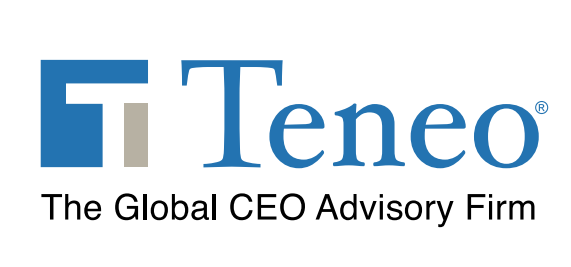
Our Private Equity Growth practice area exists solely to accelerate Enterprise Value addition for PE-backed assets. We have 40 fully-specialised staff in Europe and the US, and pride ourselves on our track record of real results for our investor clients.
SPONSOR

Striving for gender equality remains a business priority. We are committed to providing the best platform for female progression and to increasing the representation of women in the partnership and in senior management positions.
COCKTAIL RECEPTION SPONSOR


Head of Research, Actum Group
KATHLEEN VAN AERDEN
A women-only event, in a male-dominated sector, discussing diversity in a value creation context… rather unusual, and for many a first!
In addition to the incredible insights and experiences shared, this event carried a remarkably different vibe from the usual PE-centred events. The warmth, openness and honest sharing of thoughts and ideas reflected the pride the attendees have in their achievements and respective positions. Showing support for their peers in a challenging sector while knowing too well how much harder some roads have been when belonging to a minority.
Diversity is currently a hot topic, whether due to the realisation that more diverse teams operate at higher performance levels or an increase in pressure from government quota initiatives, or simply the industry as a whole, the private equity universe is now slowly moving too. With its powers of motivation and execution, private equity has significant potential to suddenly ‘get into gear’ and hopefully show a more dominant performance in this area, in turn setting a standard for other sectors to follow.
Various elements are nevertheless necessary for success. Most importantly, change needs to be driven not only from the ground up but with a firm commitment by the top management. Opportunities need to be created and serviced with a significant talent pool, where stigma is removed, unconscious biases are dropped and talent is attracted, encouraged and supported in order to enter sectors not previously considered.
Minority groups do have the keys to unlock diversity within their organisation. It is not enough to understand the issue. Some responsibilities need to be undertaken to help peers within the organisation, to be a role model, a champion and to influence changes that can be leveraged for better growth.
“
Some responsibilities need to be undertaken to help peers within the organisation, to be a role model, a champion and to influence changes that can be leveraged for better growth.

Specialist Advisor, Teneo;
Chancellor, University Of York;
CEO & Founder, Clarke Smith Advisory
DR HEATHER MELVILLE, OBE
Dr Heather Melville, OBE, who is a Specialist Advisor at global CEO advisory firm Teneo and CEO & Founder of Clarke Smith Advisory, opened Actum’s inaugural Women in Value Creation event delivering some statistics that demonstrate the imbalance of women to men working in the private equity sector.
The higher up the ladder of an investment house you look, the more noticeable this becomes, Melville said.
Women account for less than 10% of private equity investment committees, which Melville suggested was to the detriment of the industry and one that it would benefit from if addressed. “By excluding women from executive decisionmaking roles, private equity firms could be missing out on transformational opportunities,” she said
And it isn’t that women are not interested in these roles. More than one-third of private equity entry level investment positions do go to women, Melville said.
“While 23% of core investor roles within private equity firms are held by women, they make up only 12% of senior positions across the sector. The number of female VPs stand at 28%, and Principles make up 16%. Furthermore, fewer than one-in-ten women occupy the powerful investment committees where decision makers sit.”
“

NED Wolseley & Ibstock Plc
PEJU ADEBAJO
Women account for just 20% of the 10,000 senior employees working across 260 private equity companies in the UK. Peju Adebajo used this as the opening gambit to her Keynote speech that focused on Diversity, Equity and Inclusion (DEI).
As a board member of two private equitybacked and listed companies, Adebajo stressed how women’s minority representation within private equity is part of a wider challenge of discrimination and diversity.
The survey from which Adebajo initially quoted additionally shows that only 3% of senior private equity roles are occupied by females of a different ethnicity. But there are zero senior, black females across all of those surveyed, according to the British Venture Capital Association (BVCA).
“I think this is representative of the private equity industry as a whole,” Adebajo said. “It is behind in regard to gender and ethnicity compared to listed companies.”
Despite the low levels of diversity among private equity houses, there is a positive correlation between diversity and performance. Countless studies have concluded this for many years, Adebajo said. So this may lead some to ask why the topic of diversity is still to be raised in 2023.
Adebajo gave her three-point hypothesis as to why she believes there is still limited diversity within senior private equity roles. Firstly, it is possible that some companies simply have not
“
…gender diversified companies perform 25% better than those that are non-diversified, and ethnically diverse companies outperform by 36%. But among private equity, the numbers remain low.
There are some firms that may think they do not need to introduce a greater level diversity. Or that there is no pressure to do so. This is especially so in the private sector, she said.
FTSE 350 companies hit the 40% target of women on boards three years ahead of its 2025 deadline, Adebajo said, noting the comparison with lesser-populated female board among privately owned businesses. Because of the public nature of being a listed company, these businesses are under greater scrutiny and their reporting is far more transparent compared to a private company. This may influence why listed businesses are more diverse. It may also indicate why private companies are not. Many private business leaders may not feel the same level of necessity to change from tradition, Adebajo said.
And then there are those companies that simply do not support the idea of DEI, she added.
Despite this reluctance, McKinsey research shows that gender diversified companies perform 25% better than those that are nondiversified, and ethnically diverse companies outperform by 36%. But among private equity, the numbers remain low.
Compared to the 20% of private equity houses that employ women at an executive level, 34% occupy these in FTSE 350 companies, according to the BVCA. Adebajo added that only 14% of those that join private equity at entry level are women; 14% of C-suite positions in PE houses are taken by women; and only 12% of Managing Directors of investment teams are women.
While the numbers may speak for themselves, Adebajo said the importance and commitment of leadership teams towards diversity, ethnicity and inclusion is pivotal to how this changes in the future.

SARA ELLISON (MODERATOR)
Value Creation (PE),
KPMG

TANYA TRACEY
CEO, GAIN –
Girls Are INvestors

CORINNE SAWERS
KKR Capstone

SÉVERINE DE WULF
Performance Group, PAI
Partners

CÉCILE DUTHEIL
Head of Leadership and
Culture – Portfolio, Triton
PANEL DISCUSSION
Driving sustainable transformation in value creation
The private equity sector should do more to encourage diversity, equity and inclusion (DEI) within the boardrooms and executive committees of firms and portfolio companies, panellists on Actum’s Women in Private Equity Value Creation event agreed.
This was among a wide range of topics discussed including an insufficient pipeline of female talent entering the industry, the pros and cons of having to meet DEI quotas, and how to help management teams appeal to a new, more diverse generation of dealmakers.
While private equity remains a white maledominated sector, Panel Chair, Sara Ellison, Co-Head of Mid-Market Value Creation at KPMG, noted the successes and benefits that a more diverse business are likely to achieve. Diverse businesses enjoy 2.5x higher cashflow per employee; diverse management grows revenue 19%; three in four jobseekers would rather work for a diverse company; diverse teams are 87% better at decision-making; and 70% more likely to capture a new market, Ellison said citing research from Harvard Business Review.
But while these indicators show what a more diverse team may deliver, finding the right candidates can be challenging.
Tanya Tracey, CEO of Girls Are Investors (GAIN), which aims to grow the number of women working in investor management, says there are not enough women applying for these roles. GAIN visits schools and universities to
“
This emergence of introducing different demographics to work across portfolios had a real impact and created value. We can deliver better value by bringing in different types of people.
Corinne Sawers, who is a Principal at KKR Capstone focused on ESG, agreed there needs to be a greater effort put in to nurturing young and diverse talent. While acknowledging that boardrooms will not immediately be filled with a richly diverse membership, Sawers said that investment and effort need to be put into hiring a diversity of people, mentoring and shaping them for future leadership roles.
In her role as head of talent across the PAI Partners portfolio, Séverine de Wulf, said the scarcity of talent is noticeable and a challenge she is all too aware of. “The opportunity to bring in a more diverse profile of people within leadership teams is increasingly difficult,” de Wulf said.
That said, the private equity sector has changed its perspective on the importance of a diverse and well-functioning management team over time, de Wulf added.
Soon after the economic meltdown in 2008- 2009, private equity recognised it could no longer simply use smart financial structures to ‘buy-low; sell high’. It needed to work more with the asset itself. This led to a proliferation of operating partners, de Wulf explained. “This emergence of introducing different demographics to work across portfolios had a real impact and created value. We can deliver better value by bringing in different types of people,” she added.
So while attitudes may be shifting, with managers beginning to realise the benefits of having more diverse leadership, it could also be down to meeting quotas.
Quotas need to be met to diversify company boards and executive committees in countries including the UK and France.
To some, quotas like these are controversial. “There is a feeling among some that quality may suffer as a result of mandatory DEI quotas,” Sawers said. “But if these quotas are not in place, very often nothing is done,” she added relating her experience of trying to install diversity within companies.
Cécile Dutheil, Head of Leadership and Culture – Portfolio, Triton, said that while targets and quotas have been in place for many years, “the needle has barely moved”. She also agreed with others that meeting quotas was also difficult because of such a scarcity of talent.
GAIN’s target is to see women account for 50% of applications for all internship & graduate opportunities in investments teams. It stands at around 20% at present.
Educating female students about the private equity industry and encouraging them to consider it as a career option also means trying to change perceptions, Tracey said. “Private equity is not well known or understood among many young people. This needs to change through education. Private equity itself needs to do more in terms of improving its image and promoting the fact that it is a good and sustainable sector in which to work.”

England Rugby World Cup Winner
MAGGIE ALPHONSI, MBE
Being an inclusive leader, a female leader, a leader of a different ethnicity and a visible leader are all roles that guest speaker, Maggie Alphonsi MBE and former World Cup winner with the England women’s rugby team, has found herself. Bringing the event to a close, Alphonsi used her own life story to illustrate the parallels between being a successful woman in a traditionally male-associated sport, with that of women in private equity and in leadership.
In 2015, Alphonsi become the first female TV pundit and face of a men’s sporting tournament during the Rugby World Cup that year. Not 10 years on and UK television plays host a large number of female sports presenters, commentators and pundits. But being the first makes Alphonsi not just a trailblazer, but a role model. And she noted the importance of recognising that because she is in a visible position of responsibility, she is a role model to other black women in positions of power.
“It is incredibly important knowing that you have had a significant impact on somebody. To become an inclusive leader it is essential to know how to empower those around us,” she said. “It is enormously important to recognise the impact we have as leaders. This impact can be infectious throughout the team.”
She added how leadership is bigger than the individual. “[Leadership] is not about you; it’s about the people around you. And it’s about ensuring they can follow or exceed your footsteps.”
When Alphonsi was appointed to the board of the Rugby Football Union, the sport’s governing body, she was the only person of colour; only woman; and only person under 70, she remembered. And it is often the same across the boardrooms of businesses up and down the country.
This is despite so many researchers advocating the positives of working in a diverse team.
“If you have diverse voices in the room in the broadest possible sense, better decisions are made and you get better results, which translates to value. And in our job, this is what we are meant to be doing – creating value,” an audience member said as Alphonsi opened the floor and closed the evening.
“
To become an inclusive leader it is essential to know how to empower those around us.

